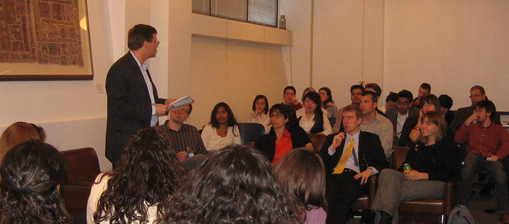| Sun | Mon | Tue | Wed | Thu | Fri | Sat |
|---|---|---|---|---|---|---|
| 1 | 2 | 3 | 4 | 5 | ||
| 6 | 7 | 8 | 9 | 10 | 11 | 12 |
| 13 | 14 | 15 | 16 | 17 | 18 | 19 |
| 20 | 21 | 22 | 23 | 24 | 25 | 26 |
| 27 | 28 | 29 | 30 | 31 |
CATEGORIES
RECENT ENTRIES
BLOG ROLL
The treadmill or the cupcake

Two students were the envy of the other public-policy fourth-years last Saturday. I was one, and my Cape Town roommate was the other. The reason: our exemption—for having been abroad—from giving 15-minute presentations on our theses at the first Public Policy Symposium.
The 45 presentations were divided into nine thematic panels. I attended “Housing Policy” in the afternoon. Caroline Weisser, ‘09, investigated whether social capital can be used to reduce crime in New York City’s public housing. She began her research after the New York City Housing Authority announced a plan in May 2008 to close hundreds of community centers because of a budget crisis. Studying several factors to measure social capital, Weisser found that informal social control (people regulating each other outside of the legal system) and collective efficacy (or a group’s understanding that it can take action) had the greatest effect on reducing crime. So she concluded that the city should keep the centers open and streamline programming.
But there was some confusion in the audience about causation versus correlation. Could Weisser’s data prove, someone asked, that the community centers are actually responsible for lowering crime? What about changes in the economy, or stricter policing, or something seemingly unrelated, like the weather?
I can sympathize with the difficulty of making causal claims when it comes to crime. My own thesis is about the Chicago Housing Authority’s police force, and I’ve learned that crime data is one of the trickiest kinds to work with. So many things affect crime that it is nearly impossible to isolate a single variable. Actual crime also differs from reported crime, which differs from arrests, which differs from convictions. And crime data in places like Chicago have been subject to political maneuvering as well, meaning that old statistics may be unreliable.
At lunchtime we took a break from student presentations to hear a keynote speaker with some expertise of his own in tricky data: Charles Wheelan, PhD'98, Harris School professor and author of Naked Economics. Wheelan discussed the disconnect between good economics and policy, and good politics. If people have an option between losing weight on a treadmill or losing weight while eating cupcakes and taking magic pills at night, he said, they choose the cupcakes, however unrealistic that may be. “The essence of public policy,” Wheelan explained, “is convincing people to use the treadmill,” and “the essence of politics is talking about cupcakes.”
Professor Woody Carter disagreed during the Q&A. A sociologist, Carter believes that “people are already on their own treadmill.” What you’re telling them, he said to Wheelan, is “get off your treadmill and get on mine.” To make good policy, he continued, “we need to understand their treadmill.”
Shira Tevah, ’09
RELATED READING
- "The Big One" (University of Chicago Magazine, June/06)
- "5 Questions with: Charlie Wheelan" (Chicago Public Radio blog, Mar. 6, 2009)
RECOMMENDED LINKS
- Web site: Harris School of Public Policy
- Web site: Public Policy Studies in the College
April 9, 2009
